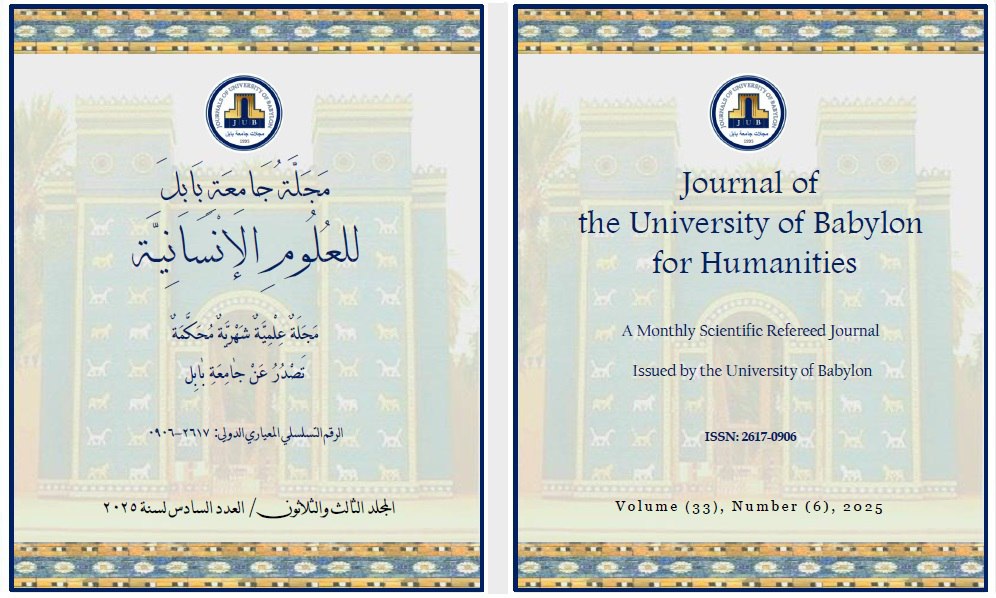Abstract
This article examines, throughout its pages, the technique of black comedy in the narratives of Ibrahim Aslan, as he relies on this technique to critique the reality of his society, revealing the unspoken negative aspects and behavioral deviations prevalent among its individuals and groups. The article draws upon Aslan's narrative output in his novels, short stories, and autobiographies, starting from the issue of Aslan's philosophy in his approach to the technique of black comedy in his narrative.
This issue raises several questions: What motives led Aslan to rely on black comedy in his narrative? How did he employ it? To what extent was it effective in expressing the unspoken in the text? And has it succeeded in mobilizing the reader's awareness to critique and adjust reality? By answering these questions, the article aims to identify Aslan's philosophy in employing black comedy in his narrative, and to examine its mechanisms and effectiveness in revealing and addressing the negative aspects of reality. Adopting the descriptive-analytical method to present, study, and draw conclusions about the phenomenon, the article is divided into two sections: a theoretical section that reviews the Implications of black comedy in Aslan's narrative world, and an applied section that discusses the manifestations of black comedy, its mechanism of employment, and its significance in his narratives. The article concludes with several findings, namely that Aslan's use of this technique is a manifestation of his maturity as a narrator who was able to express his pains and rejection of the negative aspects of his society and the deviations of its individuals in a humorous form that carries intentional structural significance. The effectiveness of this technique has also proven successful in lifting the veil on the negative aspects of the Egyptian neighborhood and the transgressions against inherited customs and traditions by its members on the one hand, and in mobilizing the reader's awareness to critique and adjust them on the other.
This issue raises several questions: What motives led Aslan to rely on black comedy in his narrative? How did he employ it? To what extent was it effective in expressing the unspoken in the text? And has it succeeded in mobilizing the reader's awareness to critique and adjust reality? By answering these questions, the article aims to identify Aslan's philosophy in employing black comedy in his narrative, and to examine its mechanisms and effectiveness in revealing and addressing the negative aspects of reality. Adopting the descriptive-analytical method to present, study, and draw conclusions about the phenomenon, the article is divided into two sections: a theoretical section that reviews the Implications of black comedy in Aslan's narrative world, and an applied section that discusses the manifestations of black comedy, its mechanism of employment, and its significance in his narratives. The article concludes with several findings, namely that Aslan's use of this technique is a manifestation of his maturity as a narrator who was able to express his pains and rejection of the negative aspects of his society and the deviations of its individuals in a humorous form that carries intentional structural significance. The effectiveness of this technique has also proven successful in lifting the veil on the negative aspects of the Egyptian neighborhood and the transgressions against inherited customs and traditions by its members on the one hand, and in mobilizing the reader's awareness to critique and adjust them on the other.
Keywords
Black comedy
Ibrahim Aslan
narrative
society.
Abstract
يعرض هذا البحث في صفحاته لتقنية الكوميديا السوداء في سرد (إبراهيم أصلان)، حيث يعوّل عليها في نقد واقع مجتمعه، ويفصح بها عن المسكوت عنه من سلبيات وانحرافات سلوكية متفشية ببن أفراده وجماعاته؛ فاعتمد المقال في مادته على نتاج (أصلان) السردي في رواياته وقصصه وسيره الذاتية، منطلقا من مشكلته حول فلسفة(أصلان) في توجهه نحو تقنية الكوميديا السوداء في سرده، على أن هذه المشكلة أفرزت عدة تساؤلات، هي: ما الدوافع التي حدت بـ(أصلان) إلى الاعتماد على الكوميديا السوداء في سرده؟ وكيف وظفها؟ وما مدى نجاحها في التعبير عن المسكوت عنه في النص؟ وهل نجحت في استنفار وعي القارئ لنقد الواقع وتقويمه؟ ويهدف المقال بإجابة هذه التساؤلات إلى التعرف على فلسفة(أصلان) في توظيف الكوميديا السوداء في سرده، والوقوف على آلياتها وجدواها في كشف سلبيات الواقع ومعالجتها. وقد اتخذ من المنهج الوصفي- التحليلي منهجًا لعرض الظاهرة ودراستها واستخلاص نتائجها، فجاءت مادته في شقين: نظري؛ يستعرض ظلال الكوميديا السوداء في عالم(أصلان) السردي، وآخر تطبيقي؛ يناقش تجليات الكوميديا السوداء وآلية توظيفها ودلالتها في سردياته؛ ليخلص إلى عدة نتائج تمثلت في أن توظيفه لهذه التقنية هو مظهر من مظاهر نضجه كسارد استطاع أن يعبّر عن آلامه ورفضه لسلبيات مجتمعه وانحرافات أفراده في صورة فكاهية تحمل دلالات البنية المقصودة لذاتها، وبدت جدوى هذه التقنية ناجعة في كشف اللثام عن سلبيات الحارة المصرية وانتهاك أفرادها لعاداتها وتقاليدها الموروثة من ناحية، واستنفار وعي القارئ إلى نقدها وتقويمها من ناحية أخرى.
Keywords
الكوميديا السوداء، السرد، إبراهيم أصلان، المجتمع.
